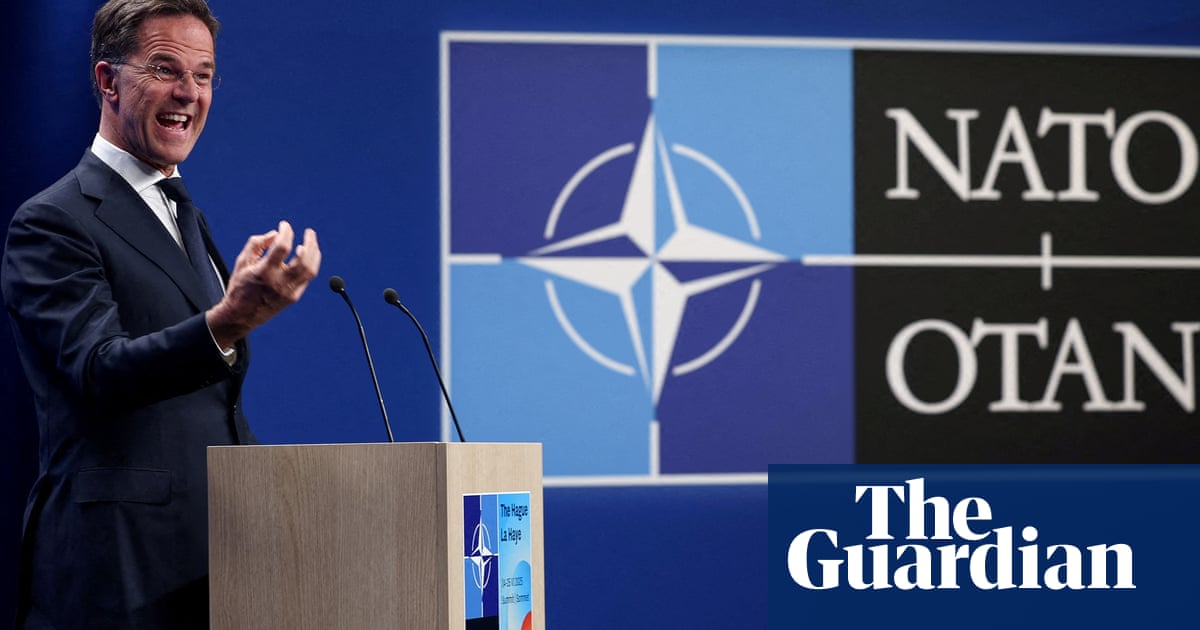Mark Rutte, Nato’s secretary general, said it was “not a difficult thing” to get members to agree to raise defence spending to 5% of GDP because of the rising threat from Russia – and stressed that Trump remained “absolutely” committed to supporting the alliance.
In an interview on the eve of the western alliance’s summit, Rutte told the Guardian that all 32 members had agreed to increase defence spending because “there is so much at stake” after Moscow’s invasion ofUkraine.
Under the planned agreement,Natomembers would commit to raising defence spending to 3.5% of GDP, with an additional 1.5% allocated to broader security-related investments, including cyber-security and intelligence.
Rutte said: “The security situation has changed so much, and people know that when the call comes [in the event an attack on a Nato member] … you now need to deliver to the collective endeavour, what you promised, that you better have your stuff there.”
It is a critical moment for the alliance, with the war in Ukraine now in its fourth year after Russia’s 2022 invasion, and the risk of a worsening conflict in the Middle East despite Donald Trump’s declaration of a ceasefire between Iran and Israel.
Speaking in his home town of The Hague, Rutte, the former Dutch prime minister, describedRussiaas “the most significant and direct threat” to Nato, warning that Moscow could be capable of launching an attack on alliance members within three to five years.
“It’s clear that they [Russia] want to extend their territory,” Rutte said. “For a couple of years now, they’ve been reconstituting themselves rapidly.”
Rutte said Russia was “already producing four times as much ammunition” as the entire Nato alliance despite having an economy worth just $2tn compared with Nato’s $50tn. “We have to make sure we get the money up,” he said.
Trump and the US have complained repeatedly that European allies rely too heavily on US military support.
From the start of his appointment in 2024, Rutte was tasked with navigating Nato’s often fraught relationship with the US president, who has at times questioned the very existence of the alliance.
Rutte, who has carefully cultivated positive relations with Trump, insisted that the US leader remains “absolutely” committed to Nato.
“I tell Europeans, please be a bit less worried and concentrate on what you can do, spending more, getting your industry going, because they [US] are committed, but they also expect us to spend more,” he said.
Trump is expected to travel to The Hague on Tuesday, though it was not immediately clear how developments in the Middle East may affect his schedule.
Rutte appeared to support US attack on Iranian nuclear facilities, describing them as a “decisive action” that paved the way for diplomatic talks.
“It was Nato consistently saying Iran should not have a nuclear capability,” he said, adding that the alliance’s reaction would be “devastating” if Iran decided to attack the bloc’s territory in response.
As the summit approached, tensions among some Nato members surfaced whenSpain signalled it would not join the alliance’s new targetfor each country to spend 5% of GDP on defence, calling the goal “unreasonable”.
Spain lags well behind other western nations by dedicating only about 1.3% of its GDP to defence spending, though it said it would not derail an agreement over the spending target. It said it could meet its contribution to Nato’s military plan by spending only 2.1%.
Trump then lashed out at the Spanish prime minister, Pedro Sánchez, and his government, saying: “Nato is going to have to deal with Spain. Spain’s been a very low payer.”
Sign up toThis is Europe
The most pressing stories and debates for Europeans – from identity to economics to the environment
after newsletter promotion
Poland on Monday also criticised what it called Spain’s “unjustified” special treatment, warning it undermined Nato unity, while Belgium said it too would ask for an exemption.
But Rutte played down the concerns, insisting that Nato “doesn’t have exceptions, exemptions, side deals or opt-outs”, on Monday. “The situation with Spain is that they have totally committed to their capability targets,” Rutte said.
Rutte appears to have made efforts to accommodate Spain, with the summit statement granting Madrid “flexibility” to determine its own path toward meeting the capability targets, though ultimately it is a matter for individual countries whether they meet alliance commitments.
The Spanish government sources have told the Guardian that the 3.5% on core defence spending varies from country to country, and will cost some countries more than 3.5% of their GDP to meet the capability target and some less.
The sources point out that Spain has its own defence industry, so, unlike other countries, does not have to pay top dollar when it wants to buy planes or warships, hence its proposed 2.1% figure.
Rutte also rejected worries among some European allies that Ukraine has been pushed into the background amid rising tensions in the Middle East and lingering fears that Trump may not want Volodymyr Zelenskyy, Ukraine’s president, to dominate the stage.
“I’m very optimistic about supporting Ukraine,” Rutte said, adding that the alliance was on an “upward trajectory” in its military assistance to Kyiv.
Unlike in previous years, this year’s summit will not include a meeting of the Nato-Ukraine Council, which brings Kyiv to the table as an equal alongside alliance members.
Zelenskyy is still expected to travel to The Hague to attend an informal dinner hosted by the Dutch king on Tuesday evening.
Ukraine is under increasing pressure, with Russian troops slowly advancing and dwindling air defences allowing a wave of deadly strikes on Kyiv – the worst seen since the early days of the invasion.
Speaking at Russia’s economic forum last Friday, Putin signalled that Moscow remains committed to its maximalist goals in Ukraine, saying he believes the whole of Ukraine is “ours” and said advancing Russian forces could take the northern Ukrainian city of Sumy.
Additional reporting by Sam Jones in Madrid
